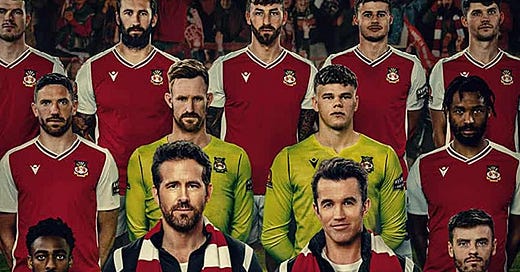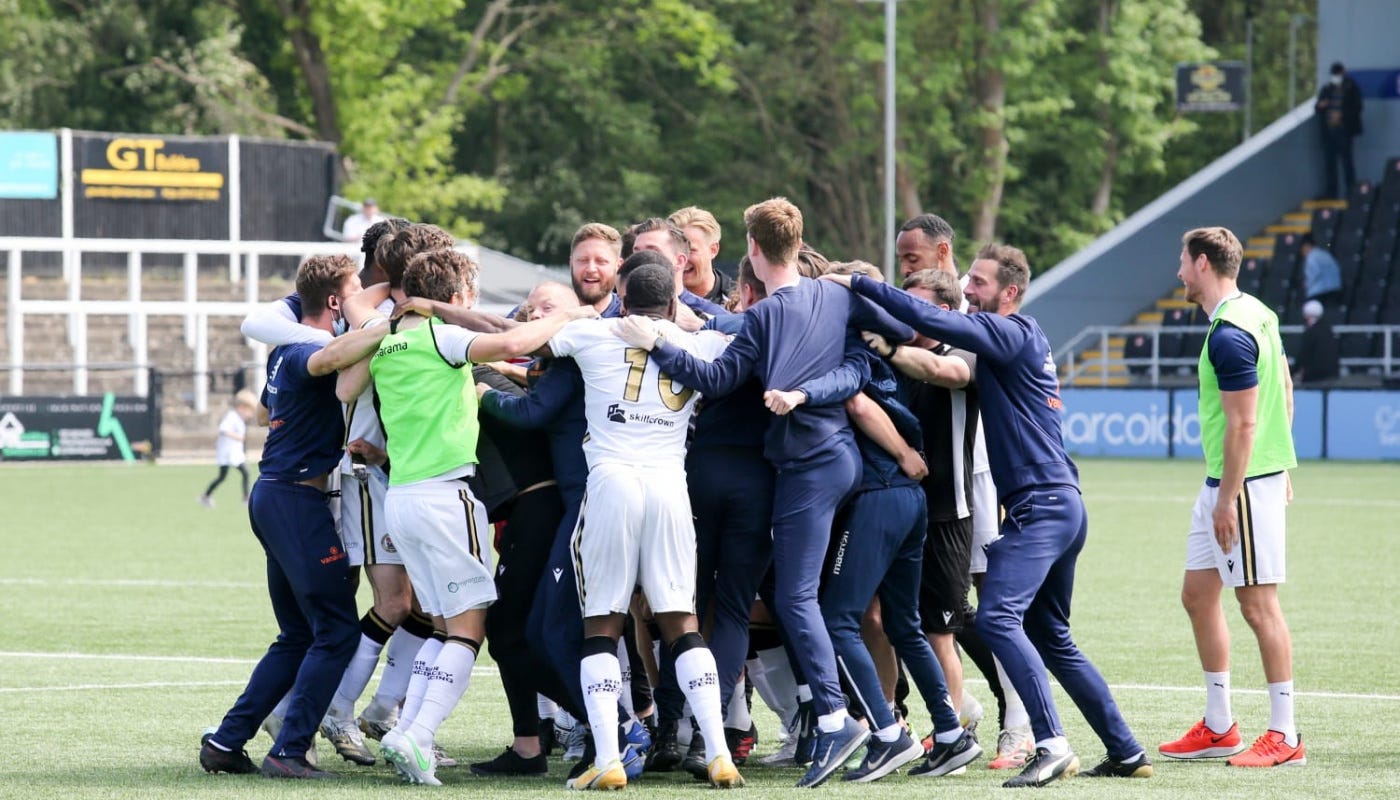Welcome to Wrexham: the million-dollar question
Is the documentary worth a watch for a National League neutral?
Wrexham’s Hollywood owners have released a fly-on-the-wall documentary. Of course they have. But is it any good? Spoiler alert: this review contains spoilers. If you don’t want to know the result, look away now.
If you’ve seen Sunderland ‘Til I Die on Netflix or the All or Nothing series on Prime Video, you know the drill. Locals are vox-popped, club staff are tearful, and everyone is passionate about their club. There will be highs and lows, rows and blows, and cringe-worthy team talks galore. It’s a trite formula, but I’ll be strapped in for the duration.
Wrexham fans' love for their football club reminds me of the Italian term campanilismo, which roughly translates as a person’s unflappable devotion to their local bell tower (campanile). In more Anglo-Saxon terms, the weather may be grim, the chips may be soggy, and the football may be crap, but dammit it’s your town’s weather, your town’s chips, and your town’s crap football. It’s the same reason you follow Bromley, even though you could’ve been a supporter of any football team (you could’ve been, you could’ve been, you could’ve been).
The first two episodes of Welcome to Wrexham, released on Disney+ last week, toss us in at the deep end of the 2020/21 National League season. In case you’re wondering, Bromley have yet to make an appearance in the series… Oh, but they will.
However…
The Cambridge Dictionary defines Schadenfreude as: ‘A feeling of pleasure or satisfaction when something bad happens to someone else.’ Despite knowing where it’s all going for Wrexham, I don’t get that feeling here. As I meet the people around the club and learn about its history, it dawns on me that I want success for them. I’m such a softy these days.
Beyond the synthetic Hollywood melodrama, the first episode explains how the fortunes of Wrexham A.F.C are twinned with the story of Wrexham itself. This once prosperous market town was ravaged by the decline of its industries in the 70s and 80s. It hasn’t fully recovered and still bears the scars of government neglect, but there’s a quiet sense of optimism underpinning the local pride. Apparently, this reminded Rob McElhenney of his home city, Philadelphia, which is what attracted him to the project.
We learn that social media banter between McElhenney and Ryan Reynolds escalated into the pair tabling a serious offer to become Wrexham’s sugar daddies. Until then, the club was owned by 2,000 members of the Wrexham Supporters Trust. With escape from the non-league continuing to evade them, and the club’s infrastructure in decline, the Trust must have sensed that investment was needed. When put to a ballot, Hollywood money is voted in by a 98% margin.
When the famous pair arrive in Wrexham, all is not rosy. With the 2020/21 season nearing its end, the team are underperforming and are in danger of missing out on the play-offs. It was news to me that Wrexham, once a Football League powerhouse, are now the National League’s longest-serving club; trapped in the dungeon since 2008.
In the second episode, it all comes down to the last game of the season. Win and they’re in the play-offs. Lose or draw and they’re out. It’s a story straight out of a Hollywood pitch, except it doesn’t have a Hollywood ending.
Going into the final game, Wrexham’s then manager, Dean Keates, is a rabbit caught in the headlights. He’s saying all of the things a manager should say, but with a hollowness that can only come from knowing your professional hourglass is down to its last grains. The whole squad seems a little stunned and deflated.
To cement this narrative, the documentary turns its lens on Wrexham’s thirty-three-year-old winger, Paul Rutherford. If Dean Keates is caught in the headlights, poor Paul doesn’t even know the truck is coming. Ignorance isn’t bliss.
The second episode opens with Rutherford being slated by Wrexham fans for his perceived lack of ability. Cut to happy-go-lucky Paul, modest family man from the Wirral, showing us around his cosy family home and enjoying a kick-around with one of his three kids. I’m getting Bambi’s mother vibes, and rightly so.
By the end of the second episode, having been sent off in the crucial last game, Paul is slumped in the dressing room, gibbering and twitching, his world crashing down around him. He watches on as his disadvantaged teammates draw 1-1 with Dagenham & Redbridge and miss out on a 7th place play-off spot. The team that nicked it? Andy Woodman’s resurgent Ravens. But that doesn't get a mention in the documentary. We’re biding our time.
The closing captions state that both Paul Rutherford and Dean Keates were released at the end of the season, along with the vast majority of the squad. It hammers home that, for all of the drama and ego on the football pitch, when you slate a player or question their motives, you all too easily forget that they’re just an ordinary person going about their lives, putting their silly pants on one leg at a time like the rest of us.
An immediate post-episode Google search reveals that, after his release from Wrexham, Paul Rutherford signed for Welsh Premier League title-chasers Bala Town. He’s well-loved there, by all accounts, and has even featured in the early rounds of the Europa Conference League. Who knows if the money is comparable with Wrexham, but at least Paul’s story isn’t over.
Dean Keates, on the other hand, hasn’t worked as a manager since his Wrexham exit. In the aftermath, he revealed in the press that he fought against the documentary crew having access to the dressing room and his office, and felt under pressure to accept their presence or lose his job. In the end, it didn’t matter.
At just forty-four years of age, Dean presumably still has lots to give as a manager. Will this be the season he springs back into the game? The National League’s managerial Sword of Damocles skewered its first victim this week: Keith Hill of Scunthorpe United. Could Dean Keates be the Iron’s missing rivet?
Off the pitch, the Hollywood partnership have installed British actor and comedy writer Humphrey Ker as their executive director. Imagine Louis Theroux crossed with David Brent and you’re about there. By his own admission, Humphrey’s only qualifications are that he’s British and happens to be friends with Rob McElhenney. This 6’7, Eton-educated fish-out-of-water seems to have been thrown in for comic value and makes a mockery of the ‘we’re taking this seriously’ vibe they’re trying to convey. Perhaps dear Humphrey will grow into the role as the series progresses, but in the first two episodes he’s pure cringe.
The celebrity owners, meanwhile, come across as genuine. Yes, they’re mining the situation for entertainment value, but they’ve put their money where their mouths are. Will that continue if Wrexham inexplicably miss out on promotion this season? Who knows. But, documentary aside, surely they have a sense of what they’ve gotten themselves into by now.
As the documentary is Hollywood-produced and airing on Hulu in the US, the show often pauses to translate British football terminology into American vernacular. I quite like this touch. But their suggestion that a club dropping from the Premier League to the National League would be the equivalent of the New York Yankees dropping so many divisions they’re playing against kids’ softball teams seems a bit much. They don’t have promotion and relegation in the US, so it needs explaining, just not like that. I’m sure Premier League founder-members Oldham Athletic would agree.
To its credit, Welcome to Wrexham doesn’t gloss over the nitty-gritty of the National League; described in the documentary as the hardest league to escape from in English football. The warts are fully on show here. But there is a sense that Wrexham are, or at least deserve to be, above it all by the sheer weight of their history and reputation. This is the same Wrexham that are the league’s longest-serving club, by the way.
So, here’s the million-dollar question. Actually, it’s the £7.99 question. If you’re not already a Disney+ subscriber, is it worth signing up to watch the documentary? I mean, it’d be worth it for the FA Trophy Final alone, right?
Personally, I’d hold off for a while. Episodes are dropping weekly, in step with Hulu’s airing schedule, so it’ll be months before you’ve got anything remotely binge-worthy. Of course, if you want to sign-up and sing along to Beauty and the Beast in the meantime, be my guest.
Hollywood loves an underdog story. But with Ryan Reynolds and Rob McElhenney’s millions at their disposal, Wrexham are no underdogs and deserve to be put under the microscope. Is a fly-on-the-wall documentary the kind of microscope they deserve? Perhaps not. Ultimately though, Welcome to Wrexham reminds us that behind every club there’s a community that cares.
We all know how last season ended for the Dragons, but now that I’ve met the people behind this club, I don’t relish seeing their inevitable anguish. Will they have more to cheer this season? Perhaps. But, while other National League clubs jealously polish their poisoned apples, I can’t help but wonder if Wrexham’s fairytale will eventually turn into a curse. For their fans’ sake, I hope it doesn’t.
Thanks for taking the time to read the article.
If you havent as yet make sure you read the other articles in the archive.
If you’d like to show an appreciation for the work that goes into this newsletter you can buy the team a coffee through the link below.
You can also find Peter Etherington on Twitter - here
Most importantly of all subscribe to the newsletter to ensure you get these updates direct to your inbox.







